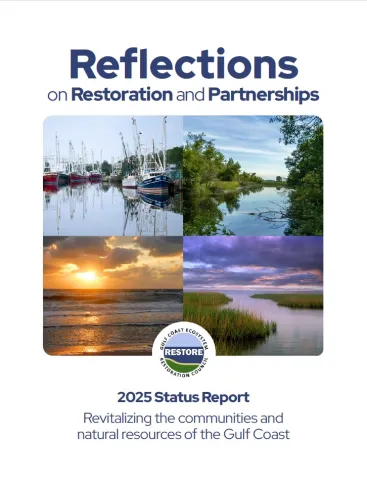GCERC Releases Reflections on Restoration and Partnership- 2025 Status Report
Gulf Coast Ecosystem Restoration Council Releases Reflections on Restoration and Partnerships, a 2025 Status Report Commemorating Fifteen Years Since the Deepwater Horizon Oil Spill
Contact Information
Gulf Coast Ecosystem Restoration Council External Affairs
(keala.hughes@restorethegulf.gov)
New Orleans, LA (April 16, 2025) - Today, the Gulf Coast Ecosystem Restoration Council (RESTORE Council) released its 2025 Status Report, Reflections on Restoration and Partnerships, marking a significant milestone in the ongoing recovery efforts of the Gulf Coast region. This comprehensive report commemorates fifteen years since the Deepwater Horizon oil spill on April 10, 2010, reflecting on the progress made and the critical partnerships that have shaped the restoration process.

The report highlights the long-term commitment of federal, state, and local agencies, along with a variety of partners, in addressing the environmental and economic impacts of the spill. Since the creation of the RESTORE Act in 2012, the Council has been at the forefront of efforts to restore ecosystems, enhance biodiversity, and support sustainable economic recovery for communities across the Gulf Coast.
"While the impact of the Deepwater Horizon disaster remains present in our memories, this report illustrates how far we’ve come in our recovery efforts," said Mary Walker, Executive Director of the Gulf Coast Ecosystem Restoration Council. "Through collaboration and innovation, we've made significant strides in restoring the Gulf Coast’s invaluable ecosystems, ensuring that the region will be resilient and vibrant for future generations."
Key achievements outlined in the report include:
- The restoration of critical habitats such as wetlands, marshes, and estuaries that support diverse marine and wildlife populations.
- The successful implementation of over 180 restoration projects, with numerous ongoing initiatives focused on habitat recovery, water quality improvement, and coastal protection.
- The establishment of long-lasting partnerships that have brought together stakeholders committed to the Gulf’s environmental recovery.
“The Gulf Coast is a vital economic and ecological hub, " said Steven Schar, Texas designee of the RESTORE Council, “and while we’ve made great progress, we know there’s more work to do. This status report reflects the hard work of all involved, and we remain dedicated to furthering this collaboration to restore the economic viability of our coastlines, wildlife, and communities.”
Read the full Reflections on Restoration and Partnerships: 2025 Status Report
For more information, media inquiries, or to schedule an interview, please contact:
Keala J. Hughes
Director of External Affairs & Tribal Relations
(504) 717-7235
keala.hughes@restorethegulf.gov
About the Gulf Coast Ecosystem Restoration Council
The Gulf Coast Ecosystem Restoration Council (RESTORE Council) was established by the Resources and Ecosystems Sustainability, Tourist Opportunities, and Revived Economies of the Gulf Coast States Act of 2012 (RESTORE Act) to restore the Gulf of America ecosystem following the Deepwater Horizon oil spill. The RESTORE Council consists of the governors of five Gulf Coast states (Alabama, Florida, Louisiana, Mississippi, and Texas) and the cabinet heads of six federal agencies (the U.S. Department of Agriculture, U.S. Department of the Army, U.S. Department of Commerce, U.S. Department of Homeland Security, and U.S. Department of the Interior, as well as the U.S. Environmental Protection Agency). The Council works in partnership with organizations across the Gulf coast to support restoration efforts and to ensure the long-term health of the Gulf coast’s ecosystems, communities, and economy.
The RESTORE Council oversees administration of two of the five components established by the RESTORE Act, representing 60% of the funds made available from the Gulf Coast Restoration Trust Fund established in the wake of the oil spill. Under the 2016 Deepwater Horizon consent decree among the United States, the five Gulf States, and British Petroleum (BP), BP makes payments into the Trust Fund over a 15-year period ending in 2031. The RESTORE Council does not receive any further Congressional appropriations; all funding comes from the Gulf Coast Restoration Trust Fund.
As settlement proceeds are deposited into the Trust Fund, the RESTORE Council works collaboratively with input from stakeholders across the Gulf to designate ecosystem projects and programs for funding. The RESTORE Council administers the Council Selected Restoration Component, which funds significant ecosystem restoration projects determined by the Council as a whole, guided by criteria set forth in the RESTORE Act and the Council’s 2022 Comprehensive Plan Update: Restoring the Gulf Coast’s Ecosystem and Economy. In addition, the RESTORE Council oversees funding for State-led restoration and recovery efforts provided in State Expenditure Plans (SEPs) developed under the RESTORE Act. The information in the Council’s “Reflections on Restoration Progress” document includes projects funded under both components.
For more information on projects in a specific geographic location, visit our RESTORE Project Map or contact:
Alabama: Amy Hunter- Amy.Hunter@dcnr.alabama.gov
Florida: Rachel Schmalfuss- deepwaterhorizon@dep.state.fl.us
Louisiana: Ryan Shaw - ryan.shaw@la.gov
Mississippi: Jan Schaefer- jschaefer@mdeq.ms.gov
Texas: Melissa Porter- melissa.porter@tceq.texas.gov
